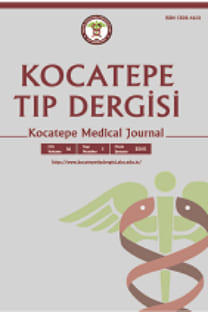COVİD-19 SALGININDA SAĞLIK ÇALIŞANLARINDA DEPRESYON, ANKSİYETE, STRES, TRAVMA DÜZEYİ VE D TİPİ KİŞİLİK: VAKA - KONTROL ÇALIŞMASI
Anksiyete, COVID-19 virüs, Psikolojik stres, Kişilik, Sağlık çalışanı, Anxiety, COVID-19 virus, Psychological stress, Personality, Healthcare professional
DEPRESSION, ANXIETY, STRESS, TRAUMA LEVEL, AND TYPE D PERSONALITY AMONG HEALTHCARE PROFESSIONALS DURING COVID-19 PANDEMIC: CASE-CONTROL STUDY
Anksiyete, COVID-19 virüs, Psikolojik stres, Kişilik, Sağlık çalışanı, Anxiety, COVID-19 virus, Psychological stress, Personality, Healthcare professional,
___
- 1. Dutheil F, Mondillon L, Navel V. PTSD as the second tsunami of the SARS-Cov-2 pandemic. Psychol Med. 2021;51(10):1773-4.
- 2. Torales J, O’Higgins M, Castaldelli-Maia JM, Ventriglio A. The outbreak of COVID-19 coronavirus and its impact on global mental health. Int J Soc Psychiatry. 2020;66(4):317-20.
- 3. Wu KK, Chan SK, Ma TM. Posttraumatic stress, anxiety, and depression in survivors of severe acute respiratory syndrome (SARS). J Trauma Stress. 2005;18(1):39–42.
- 4. Denollet J. DS14: Standard assessment of negative affectivity, social inhibition, and Type D personality. Psychosom Med. 2005;67(1):89–97.
- 5. Nydegger R, Nydegger L, Basile F. Post-traumatic stress disorder and coping among career professional firefighters. Am J Health Sci. 2011;2(1):11–20.
- 6. Miller MW. Personality and the etiology and expression of PTSD: A three‐factor model perspective. Clin Psychol. 2003;10(4):373–93.
- 7. Lovibond PF, Lovibond SH. The structure of negative emotional states: Comparison of the Depression Anxiety Stress Scales (DASS) with the Beck Depression and Anxiety Inventories. Behav Res Ther. 1995;33(3):335-43.
- 8. Yılmaz Ö, Boz H, Arslan A. Depresyon Anksiyete Stres Ölçeğinin (Dass 21) Türkçe Kısa Formunun Geçerlilik-Güvenilirlik Çalışması. Finans Ekonomi ve Sosyal Araştırmalar Dergisi (FESA). 2017;2(2):78-91.
- 9. Le TA. Multi-level predictors of psychological problems among methadone maintenance treatment patients in difference types of settings in Vietnam. Subst Abus Treat Prev Policy. 2019;14:39.
- 10. Alçelik A, Yıldırım O, Canan F, Eroğlu M, Aktaş G, Şavlı H. A preliminary psychometric evaluation of the type D personality construct in Turkish hemodialysis patients. Journal of Mood Disorders. 2012;2(1):1-5.
- 11. Wilson JP, Keane TM (edited by). Assessing psychological trauma and PTSD. 2nd Edition. New York: Guilford Press.1997:399–411.
- 12. Çorapçıoğlu A, Yargıç İ, Geyran P Kocabaşoğlu N. Olayların Etkisi Ölçeği” (IES-R) Türkçe versiyonunun geçerlilik ve güvenirliği. Yeni Symposium. 2006;44(1):14-22.
- 13. Creamer M, Bell R, Failla S. Psychometric properties of the Impact of Event Scale-Revised. Behav Res Ther. 2003;41:1489–96.
- 14. Hasson D, Arnetz BB. Validation and findings comparing VAS vs. Likert scales for psychosocial measurements. International Electronic Journal Health Education. 2005;8:178–92.
- 15. Lenzo V, Quattropani MC, Musetti A, et al. Resilience contributes to low emotional impact of the COVID-19 outbreak among the general population in Italy. Front Psychol. 2020;11:576485.
- 16. Liu S, Yang LL, Zhang CX, et al. Online mental health services in China during the COVID-19 outbreak. Lancet Psychiatry. 2020;7(4):17–18.
- 17. Pappa S, Ntella V, Giannakas T, et al. Prevalence of depression, anxiety, and insomnia among healthcare workers during the COVID-19 pandemic: a systemic review and meta-analysis. Brain Behav Immun. 2020;88: 901–7.
- 18. Simione L, Gnagnarella C. Differences between health workers and general population in risk perception, behaviors, and psychological distress related to COVID-19 spread in Italy. Front Psychol. 2020;(11):2166.
- 19. Lee SM, Kang WS, Cho AR, Kim T, Park JK. Psychological impact of the 2015 MERS outbreak on hospital workers and quarantined hemodialysis patients. Compr Psychiatry. 2018;87:123–7.
- 20. Chan AO, Huak CY. Psychological impact of the 2003 severe acute respiratory syndrome outbreak on health care workers in a medium size regional general hospital in Singapore. Occup Med (Lond). 2004;54(3):190–6.
- 21. Wang C, Pan R, Wan X, et al. Immediate psychological responses and associated factors during the initial stage of the 2019 coronavirus disease (COVID-19) epidemic among the general population in China. Int J Environ Res Public Health. 2020;17(5):1729.
- 22. Tekin A, Karadag H, Yayla S. The relationship between burnout symptoms and Type D personality among health care professionals in Turkey. Arch Environ Occup Health. 2017;72(3):173–7.
- 23. Oginska-Bulik, N. Occupational stress and its consequences in healthcare professionals: the role of type D personality. Int J Occup Med Environ Health. 2006;19(2):113-22.
- 24. Tuman TC. (2021). The effect of type D personality on anxiety, depression and fear of COVID-19 disease in healthcare workers. Arch Environ Occup Health. 2021;15:1-8.
- 25. Marcisz-Dyla E, Dąbek J, Irzyniec T, Marcisz C. Personality Traits, Strategies of Coping with Stress and Psychophysical Wellbeing of Surgical and Non-Surgical Doctors in Poland. Int J Environ Res Public Health. 2022;19(3):1646.
- 26. Kim YH, Kim SR, Kim YO, Kim JY, Kim HK, Kim HY. Influence of type D personality on job stress and job satisfaction in clinical nurses: the mediating effects of compassion fatigue, burnout, and compassion satisfaction. J Adv Nurs. 2017;73(4):905–16.
- ISSN: 1302-4612
- Yayın Aralığı: Yılda 4 Sayı
- Başlangıç: 1999
COVİD-19 SÜRECİNDE CERRAHİ HEMŞİRELERİNİN MENTAL SAĞLIĞI VE UYKU KALİTESİ
Pakize ÖZYÜREK, Özlem SOYER ER, Gülçin GÜL
Hatice Şeyma AKÇA, Serdar ÖZDEMİR, Abdullah ALGIN, İbrahim ALTUNOK, Evrim KAR
GLOKOM HASTALARINDA SHEAR WAVE ELASTOGRAFİ BULGULARI
Azad HEKİMOĞLU, Onur ERGUN, Aysun ŞANAL DOGAN, Şule BERK ERGUN, Mutlu ACAR, Canan GÜRDAL, Baki HEKİMOĞLU
MEATUS ACUSTICUS INTERNUS MORFOMETRİSİ VE HACMİNİN BELİRLENMESİ
Abdülkadir BİLİR, Zeliha FAZLIOĞULLARI, Mehmet TATAR, Alaaddin NAYMAN
BÖBREK NAKLİ ALICILARINDA ÖZ-YÖNETİM GÜCÜNÜ ETKİLEYEN PARAMETRELERİN ARAŞTIRILMASI
FARKLI YAŞLARDAKİ OPERE EDİLEN VSD'Lİ HASTALARIN DEĞERLENDİRİLMESİ
Abdurrahim ÇOLAK, Necip BECİT, Uğur KAYA, Munacettin CEVİZ
ROMATOİD ARTRİTİN KLİNİK TEDAVİSİNDE KULLANILAN DİYET YAKLAŞIMLARININ DEĞERLENDİRİLMESİ
